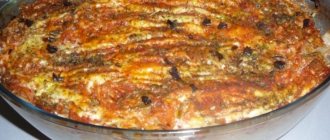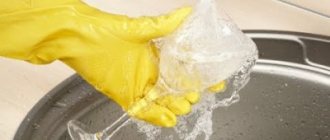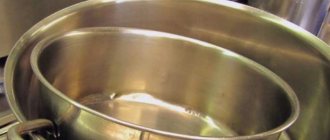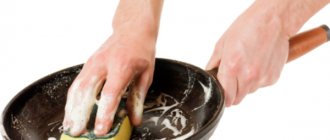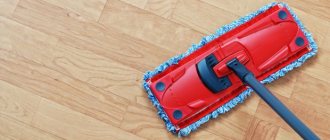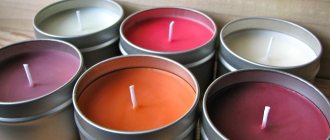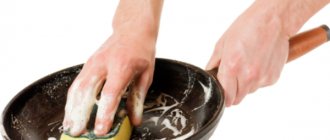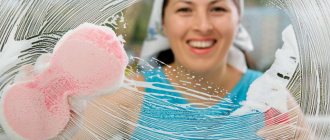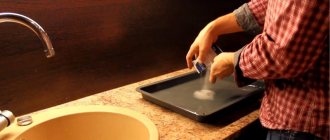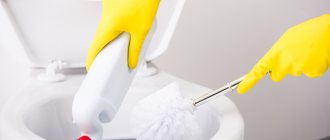Glassware for the oven is beautiful to look at, practical to use, and safe for health. Its disadvantage is that such material is subject to the appearance of soot, grease stains, stains, soot, and other types of contaminants. But you can cope with them by using a folk or commercial remedy. It is important to choose the appropriate composition for this type of cookware.
The main causes of glassware contamination
Glass dishes for the oven quickly become dirty and become covered with small cracks. This happens for several reasons:
- use of detergent with an aggressive composition for cleaning;
- dense arrangement of objects in the oven;
- a sharp change in temperature from hot to cold and vice versa;
- use for treating hard or hot water.
Therefore, in order to prevent premature aging or contamination of ovenware, it is necessary to follow basic preventive measures: place items at a distance from each other, use purified filtered water and gentle dishwashing detergents for processing.
Attention! Stains may appear due to natural wear and tear of the material - aging. The lower the quality of the dishes, the sooner this will happen. It is recommended to buy high-quality oven accessories, then it will retain its performance properties longer.
Tips for preventing grease from forming on the baking sheet surface
The easiest option to avoid problems with contamination is to use foil or special paper for baking. It is better to wash the baking sheet immediately after preparing the dish. If time is running out and you can’t wash the dishes on time, you should at least fill it with plain water.
One of the most effective means for cleaning carbon deposits is laundry soap.
Otherwise, you can choose one of the following methods to clean the pan. Don't forget about your hands; it is recommended to use gloves.
It is better to wash off leftover food and fat immediately. If time does not allow, you need to soak the dishes in hot water with added detergent.
Recipe 4. Ammonia + soda
Simply wiping the glass with a damp cloth after each cooking, without using special products, allows you to remove most of the fresh dirt.
Expert opinion
Ksenia Diyanova, expert on beauty, purity, harmony
Ask me any questions, I will be happy to answer!
Recipes do not always indicate the correct temperature or cooking time for the pie, so you need to constantly monitor the process. Thanks to the active substances contained in the well-known lemon and vinegar, the solution is quite powerful. Mustard powder remedy Ask me all your questions, I will be happy to answer!
How to clean glassware to make it shine
Every housewife wants everything in her house to shine, including baking dishes. The task is quite real. Two effective folk remedies will allow you to wash glass until it shines; one of them is based on regular toothpaste, and the second is made from acid.
Toothpaste
Toothpaste is something that everyone has in their home. Surprisingly, you can use it to make a cleaning agent that can easily deal with carbon deposits, greasy stains, and add shine to dishes. To prepare it you need:
- Squeeze a small amount of toothpaste into the container.
- Pour in a little ammonia.
- Mix the contents thoroughly.
The resulting mixture should be spread in a thin layer over the entire surface of the dish and left to soak for several minutes. All this time you need to monitor it, it should not start to dry out. The paste combined with ammonia must be washed off with cold water, and the glass should be wiped dry with a soft, dry cloth.
Acid
Another effective method for cleaning glass is citric acid. A small amount of this liquid needs to be added to the dishwasher to put it into operation. If you don’t have citric acid at home, you can use apple or vinegar essence instead. The advantage of this method is that this folk remedy can add shine to any type of glass.
Recommendations
- If the oven has removable shelves and racks, they must be cleaned separately. To do this, you can immerse them in a container of warm water and add dishwashing liquid.
- Large accumulations of fat and burnt food must first be scraped off.
- When applying cleaning agents, you need to act carefully, because they should not come into contact with door seals and heating elements.
- Any cleaning product takes time, so don’t rush or rush things.
- To clean the oven, you can use medium-hard brushes.
- Remove detergent with a clean and slightly damp cloth.
- The main thing is to try to remove burnt food and grease immediately after cooking or at least once a week. This way you can protect yourself from stubborn stains and grease deposits.
You can clean glass using a conventional steam generator. It will clean dirt of any complexity with a powerful jet. Will not damage glass surfaces. But not everyone has such a thing at home. Don't despair. You just need to take a heat-resistant container and pour water into it. And you can also add dishwashing liquid. Place the dishes in a preheated oven at 150 degrees and bring to a boil. Leave to evaporate for half an hour. After everything has cooled, remove any softened dirt.
How to clean glassware from grease: several ways to quickly clean dishes until they shine
If all traditional methods have been used, but the dishes are far from ideal cleanliness, it’s time to resort to using household chemicals. To choose the right product, you should use several tips.
Expert opinion
Ksenia Diyanova, expert on beauty, purity, harmony
Ask me any questions, I will be happy to answer!
Soak the tray or baking dish that has oven residue and frozen drops of fat in the resulting solution. Advice: Do not use baking soda to clean the entire oven; this product is more effective and safer for surfaces when applied to local stains. 5 folk remedies to clean glass in the oven until it shines Ask me all your questions, I will be happy to answer!
How to clean oven glassware from heavy carbon deposits
Dishes that are prepared in the oven are healthy, safe for health, incredibly aromatic and tasty. They can be prepared only in specialized containers that can withstand high temperatures of up to 200-250 degrees. But, when cooking, soot and soot appears on it. To quickly get rid of these defects and give the glass its previous appearance, you need to do a number of actions:
- Pour hot water into the container, preferably boiled.
- Dilute a small amount of dishwashing detergent. If there are no suitable household chemicals with a gentle composition, then shavings of laundry soap can be an alternative.
- Pour the soap solution into the dishes that need to be cleaned of carbon deposits.
- Close the door, turn on the equipment, selecting a temperature mode of 120 degrees.
- After 30 minutes, remove the baking container and wait for the soap solution to cool to room temperature.
- Rinse it with water and wipe with a soft, dry cloth. Use a damp cloth to wipe the walls of the oven.
If the treatment is carried out correctly, then soot, dirt, grease and soot should disappear from the dishes. If necessary, you can repeat it to achieve greater effect. After completing the procedure, it is recommended to leave the oven door open for several hours to remove the smell of soap or cleaning product.
Attention! It is strongly recommended not to soak glass containers in hot water or boiling water. It is necessary to ensure that the liquid is at a temperature at which you can hold your hands for several seconds without burning your hands. It is also strictly forbidden to dilute hot water with cold water, as this may cause the glass to burst or crack. The liquid should cool naturally.
Safety regulations
The housewife decides how to clean the baking sheet from the oven, focusing on the material from which it is made. Many people prefer aggressive products that easily destroy fat and other food debris. Household chemicals with a high content of acid and alkali must be used strictly according to the instructions.
Gloves are worn to protect the skin of your hands. They protect the skin from chemical burns. Fumes from using aggressive products are poisonous. In high concentrations they cause poisoning. The kitchen should be well ventilated. It is better to turn on the hood and open the window slightly to allow air flow.
If the protective layer is damaged, it is better to buy a new baking sheet.
How to choose safe household chemicals
A store-bought product will allow you to quickly and carefully wash dishes, remove residual grease and soot and give them shine. You can find it on the shelves in the following release forms:
- Liquid gels. Used for daily hand cleaning of dishes. The most popular among buyers are “Bio Mio”, “Biolan” and “Sorti”.
- Powders and tablets. Suitable for use in the dishwasher, they dissolve quickly and are easily washed off.
It is worth considering that not every detergent is suitable for processing glass. When purchasing it, it is worth considering that it meets the following requirements:
- absence of chlorine bleaches, phosphates, caustic alkalis and acids;
- the presence of concentrates, which allows the liquid to foam easily and gently remove contaminants.
You should carefully study the packaging of the cleaner. It is recommended that it bear a statement stating that it has been dermatologically tested and is absolutely safe for health. This means that after its use there will be no allergic reaction and no irritation on the skin of the hands.
Folk remedies
Caring for glass is not a budget task. As a rule, those products that have a gentle composition are 2-3 times more expensive than regular dishwashing gel. It is more profitable to wash glass with a folk remedy. As a basis for it, anything you can find at home or can buy in a store at a low price, for example, soap, hydrogen peroxide, ammonia, mustard, vinegar, eggs, potatoes, soda or salt with sand, is suitable.
Soap
You can wash glassware for the oven from heavy carbon deposits using regular soap. It is recommended to use a baby hygiene product, as it is hyperallergenic and has a gentle composition. For this method of removing contamination, you will need food foil. The procedure consists of several main steps:
- Take soap and a small piece of foil in your hands at the same time.
- Knead it for a few seconds.
- Wipe the dishes with a soapy piece of foil under running water.
- As soon as the plaque disappears, you need to rinse the container with cool water.
- Wipe it carefully with a dry and soft cloth.
It is strongly recommended not to make intense movements when trying to scrape off scale or carbon deposits during processing. This will lead to scratches appearing on the surface of the glass, which will be impossible to get rid of in the future. You should not make intense movements when cleaning dishes with a dry cloth.
Hydrogen peroxide
Carbon deposits on the outside can be achieved using hydrogen peroxide. To do this, add it to baking soda in such an amount that it forms a consistency similar to sour cream. The resulting paste should be carefully applied to the problem areas and left to soak for 35 minutes. Additionally, you can wrap the walls with cling film to achieve a better effect. After 35 minutes, you can wash off the softened carbon deposits in the usual way.
Hydrogen peroxide and soda
The product is suitable for cleaning old and thick fatty deposits. A small amount of baking soda is diluted with peroxide to the consistency of thick sour cream and applied to the dishes. After 35–40 minutes, the carbon deposits are wiped off with a hard sponge or brush.
These methods will help you deal with stains and restore your dishes to their original appearance.
Source
How to care for glassware
Glassware requires special care. Only in this case will she always look neat. The first rule of care is proper processing. It should be washed with a soft sponge and liquid products. Any abrasive substance or hard sponge will damage the surface. It is also recommended to remove jewelry from your fingers before processing.
After each wash, wipe the product with a soft cloth or place it upside down on a towel. Otherwise, stains will appear, which will be difficult to get rid of in the future. If the mold is not used for cooking for a long time, then it still needs to be washed once every 2-3 months to remove dust accumulated on the surface.
